High-frequency trading (HFT) performed by computers increases price efficiency in markets, according to a new report commissioned and published by the European Central Bank (ECB).
Seen as the death knell for traditional open outcry pits, HFT has been blamed for numerous glitches, pricing errors and "flash crashes" but this new study, released in November by the ECB, warned governments across the globe against curbing the operations without installing other measures to support market efficiency.
"Our research suggests, within the confines of our methodological approach, that HFT (high-frequency traders) provide a useful service to markets. They reduce the noise component of prices and acquire and trade on different types of information, making prices more efficient overall," U.S. academics Jonathan Brogaard, Terrence Hendershott and Ryan Riordan said in the publication.
(Read More: Italy launches tax on high-frequency transactions)
"HFTs facilitate price efficiency by trading in the direction of permanent price changes and in the opposite direction of transitory pricing errors, both on average and on the highest volatility days."
High-frequency trading uses software to post trades in microseconds. Since the 1980s computer automation has replaced human trading in most of the stock exchanges around the world. Even traders at the CBOE (Chicago Board of Options Exchange), famed for its brash, loud and colorful culture of open outcry and hand signals has seen a decline since the 1990s.

This rise of the machines has been joined by a series of high profile trading errors which have caused many to criticize the new technology. Computer algorithms were credited with causing the 2010 "flash crash," after high-frequency traders started aggressively selling. At that point, more than 60 percent of U.S. equity trades were accounted for by HFT, according to Bloomberg.
(Read More: High-Frequency Traders Face Speed Limits)
This year, the Nasdaq suffered a three-hour trading halt, following a technical glitch. In China, brokerage Everbright Securities faces tough sanctions after a glitch in its computer systems caused a spike of over 5 percent in domestic stock indexes. Goldman Sachs experienced a trading glitch in August that resulted in a large number of erroneous single stock and ETF options trades. Also in August, Germany's Eurex – a trading platform for derivative contracts – halted trading briefly due to unspecified technical problems.
Financial Industry Regulatory Authority (Finra), a Wall Street regulator, is conducting a review into the practices and the Commodity Futures Trading Commission (CFTC) has also announced it is formulating a plan to rein in computer trading.
But despite the intense, critical views on HFT, this latest report suggests that there are some benefits ,with computers providing liquidity in markets instead of humans.
(Read More: Automation and Nasdaq's trading glitch)
"There is free entry into becoming an HFT, HFTs do not have a designated role with special privileges, and HFTs do not have special obligations," it said.
"When considering the best way to organize securities markets and particularly the intermediation sector, the current one with HFT more resembles a highly competitive environment than a traditional market structure."
By CNBC.com's Matt Clinch. Follow him on Twitter @mattclinch81


